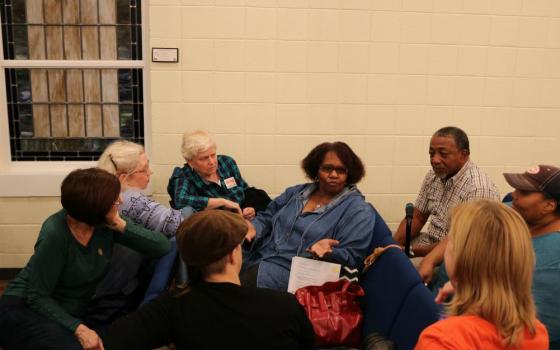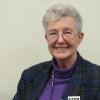As we neared Savannah, Georgia, on Oct. 30, I wished we could become tourists for a day and visit the mysterious streets in the old town and the cemeteries shrouded by huge oak trees draped with Spanish moss. (This from reading Midnight in the Garden of Good and Evil!)
But duty called, and we headed for ConneXion Church for a town hall. We were surprised at the number of sisters of various congregations who turned out for it. Some Dominicans drove two hours up from Jacksonville, Florida.
At this and the other town halls, the Nuns on the Bus acted out a human bar graph, taking the roles of real people who represented each economic quintile, including the top 1 percent, and corporations.
While the poor sister representing the lowest economic quintile took about six steps forward to show how much she benefited from the tax policy in various ways — she would later take many more steps backward because of other mounting expenses — the next three quintiles did not do much better.
Compare that to the sister representing the top 1 percent, who took 1,700 steps forward. I acted that role once and barely finished stepping it off. But as I was taking my journey of 1,700 steps, the sister representing corporations flew around the hall and would have been walking all night, taking uncountable steps: She just started walking and walked until we yelled at her to stop. The indignation and horror on the faces of the audience was delightful to see. They got it.
Perhaps the best part was when the audience broke into groups and we got to listen to what they saw as the issues for their city along with their suggested solutions.
And we gave the alarming news about the tax bill's effect on the national debt: $1.9 trillion. What does that really mean? The Network staff figured it up: If you spent $1 per second, it would take you about 60,300 years to spend $1.9 trillion.
Never fear! Congress already knows how to pay for it: Cut programs like Medicare and food programs. Other losers would be some of the wonderful programs we have seen on our site visits: programs for women, children, the elderly, immigrants and refugees, those whose mission is providing food, rehabilitating former prisoners and helping those without homes, just to name a few. Even some that don't rely on a large amount of government help will suffer because the people and organizations who help them will feel the economic pinch. For example, Arizona charities may lose about $170 million in annual giving because of federal tax law changes.
In the last part of the town hall, the audience buzzed in small groups, surfacing the major issues of their own city. The people of Savannah were very open about the things they are concerned about: health care and housing for the working poor (issues we have been hearing about all across the country) and the apparent intent of the city to clear out people living in poverty to make room for urban development.
When we finished, we did have a touristy treat: The sisters got to spend the night on nearby Tybee Island at a couple of beach houses the diocese and local parish own. We can say we did our Nuns on the Bus tour from sea to shining sea! We arrived in the dark and had to leave before sunrise the next morning, but we got to say our prayers on the beach, watching the dawn break and color the sky.
Our Halloween stop: Apopka, Florida, at one time the hometown of a former head of the regional Ku Klux Klan. And there, in the shadow of Cinderella's Castle (we were a few miles north of Orlando and Disney World), we were met by a flock of butterflies, a veritable march of mariposas that escorted us into the Hope CommUnity Center, a ministry of the Sisters of Notre Dame de Namur for many years, including for Sr. Ann Kendrick, one of the organization's founders.
Located near two landfills in an area contaminated by industrial agricultural chemicals, the center and its staff have set out to work in harmony with nature. They work with the Farmworker Association of Florida in building community, providing a safe place, making changes, and making people proud of who they are. They teach English, life skills and career skills and do special training programs like those on pesticide and heat-stress safety. There is a health project that began as a clinic in a trailer home that now employs 500 people and provides dental and optician services.
Many staff members, volunteers and peer groups work with new migrants, young people in the Deferred Action for Childhood Arrivals program, and outside groups. They bring in students from 20 colleges and high schools for internships to do agricultural work and to live with a local family.
The young people of the center put on an inspiring presentation, "Walk a Mile in My Shoes." Another young leader led us in a chant:
It is our duty to love and support one another.
It is our duty to win.
It is our duty to fight for each other.
We have nothing to lose but our chains.
There are many reasons for the young Mariposas (we called them that because of the butterfly signs they carried) to lose hope. The current administration is, on a daily basis, overturning 90 years' worth of legal safety regulations that have been developed to protect agricultural workers. But they have discovered that hope comes from community and collaboration and are not to be daunted.
The Hope CommUnity Center and places like it have certainly given us hope!
[Ursuline Sr. Michele Morek is Global Sisters Report's liaison to sisters in North America. Her email address is mmorek@ncronline.org. Follow her on Twitter: @MicheleMorek.]




